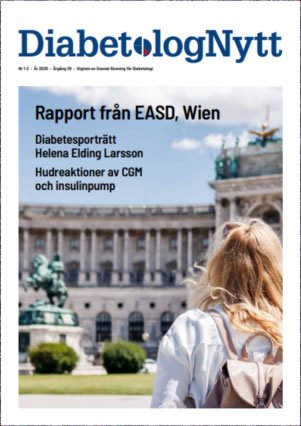The Committee for Medicinal Products for Human Use (CHMP) of the European Medicines Agency (EMA) has recommended Febr 1 an additional indication for dapagliflozin (Forxiga/Farxiga/Edistride, AstraZeneca) for use in adults with type 1 diabetes who meet certain criteria.
The drug, a selective sodium-glucose cotransporter 2 (SGLT2) inhibitor, is already approved for use in type 2 diabetes in the European Union, United States, and elsewhere.
If given the okay for this new use in the European Union, usually a formality, dapagliflozin would be the first oral add-on treatment to insulin for type 1 diabetes anywhere in the world.
To mitigate the risk for diabetic ketoacidosis (DKA) among patients with type 1 diabetes in trials of several different SGLT2 inhibitors, the proposed EU indication limits dapagliflozin’s use
1. to patients with type 1 diabetes with a body mass index of 27 kg/m2 or higher
2. who aren’t meeting glycemic goals despite high insulin doses.
3. Insulin doses would need to be continuously optimized during dapagliflozin treatment by a diabetes specialist and only reduced to avoid hypoglycemia.
4. And patients would need to be instructed to control ketone levels and recognize risk factors and signs and symptoms of DKA.
The CHMP positive opinion was based on data from two phase 3 clinical trials from the DEPICT (Dapagliflozin Evaluation in Patients With Inadequately Controlled Type 1 Diabetes) clinical program.
As previously reported by Medscape Medical News, both DEPICT-1 and DEPICT-2 were 24-week randomized, double-blinded trials with long-term extensions up to 52 weeks and each included about 800 patients. In both trials, significant reductions in HbA1c (the primary endpoint), weight, and total daily insulin dose were achieved with both 5-mg and 10-mg doses of dapagliflozin.
But many experts worry that the risk for DKA may be much greater if such agents are used under real-world conditions, without the close monitoring performed in clinical trials.
That concern was expressed at a recent US Food and Drug Administration advisory panel meeting for sotagliflozin (Sanofi/Lexicon), a dual SGLT1 and SGLT2 inhibitor.
That panel vote was split down the middle, 8-8, on whether the benefits outweigh the risks for the drug as an add-on for type 1 diabetes, and even those who voted in favor did so with strong recommendations for DKA risk mitigation. Some advised that the company provide ketone testing kits for patients along with the medication.
An FDA decision on approval of sotagliflozin is expected by the end of March.
From www.medscape.com
_____________________
Forxiga receives positive EU CHMP opinion for the treatment of adults with type-1 diabetes
Pressmeddelande Astra Zeneca • Feb 01, 2019 14:19 CET
Forxiga is the first oral medicine recommended for approval in Europe
as an adjunct treatment to insulin for adults with type-1 diabetes
The Committee for Medicinal Products for Human Use (CHMP) of the European Medicines Agency (EMA) has recommended a new indication for the marketing authorisation of Forxiga(dapagliflozin), after adopting a positive opinion for use as an oral adjunct treatment to insulin in adults with type-1 diabetes (T1D).
Forxiga, a selective sodium glucose cotransporter-2 (SGLT2) inhibitor, is the first oral medicine to receive a positive recommendation from the EMA for use in T1D as an adjunct to insulin in patients with BMI ≥ 27 kg/m2, when insulin alone does not provide adequate glycaemic control despite optimal insulin therapy. The positive opinion is based on Phase III data from the DEPICT (Dapagliflozin Evaluation in Patients With Inadequately Controlled Type 1-Diabetes) clinical programme.
Elisabeth Björk, Vice President, Head of Cardiovascular, Renal and Metabolism, BioPharmaceuticals, said: “People with type-1 diabetes have not seen oral treatment innovation in decades and we believe today’s announcement signals an important advancement for them, as well as a broader understanding of the well-established clinical profile of Forxiga for people living with metabolic diseases.”
The DEPICT clinical programme consists of two trials, DEPICT-1 and -2, with the primary efficacy endpoint at 24 weeks and a long-term extension up to 52 weeks. Both trials demonstrated that Forxiga, when given as an oral adjunct to adjustable insulin in adults with inadequately-controlled T1D, showed significant reductions from baseline in HbA1c (primary endpoint), weight and total daily insulin dose (secondary endpoints) at 24 and 52 weeks, vs. placebo, at both 5mg and 10mg doses.1,2,3
Forxiga is also under regulatory review in the US and Japan for use as adjunct treatment to insulin in adults with T1D.
About the DEPICT clinical programme
The DEPICT clinical trial programme consists of two clinical trials: DEPICT-1 (NCT02268214) and DEPICT-2 (NCT02460978). DEPICT-1 and DEPICT-2 are 24-week, randomised, double-blinded, parallel-controlled trials designed to assess the effects of Forxiga 5mg or 10mg on glycaemic control in patients with T1D inadequately controlled by insulin. All patients were evaluated at week 24 and after a 28-week extension (52 weeks in total).
About Forxiga
Forxiga (dapagliflozin)is a first-in-class, oral once-daily selective inhibitor of human sodium-glucose co-transporter 2 (SGLT2) indicated as both monotherapy and as part of combination therapy to improve glycaemic control, with the additional benefits of weight loss and blood pressure reduction, as an adjunct to diet and exercise in adults with T2D. Forxiga has a robust clinical trial programme of more than 35 completed and ongoing Phase IIb/III trials in over 35,000 patients, as well as more than 1.8 million patient-years’ experience.
References
1.Dandona P, Mathieu C, Phillip M, et al. Efficacy and safety of dapagliflozin in patients with inadequately controlled type 1 diabetes (DEPICT-1): 24-week results from a randomised controlled trial. Lancet Diabetes and Endocrinol. http://dx.doi.org/10.1016/PII. Published Online September 14, 2017.
2.Mathieu C, Dandona, P, Gillard, P, et al. Efficacy and Safety of Dapagliflozin in Patients With Inadequately Controlled Type 1 Diabetes (the DEPICT-2 Study): 24-Week Results From a Randomized Controlled Trial. Diabetes Care 2018;41:1938–1946.
3.Dandona P, Mathieu C, Phillip M, et al. Efficacy and safety of dapagliflozin in patients with inadequately controlled type 1 diabetes: The Depict-1 52-week study. Diabetes Care 2018 Dec; 41(12): 2552-2559.
Nyhetsinfo
www red DiabetologNytt

